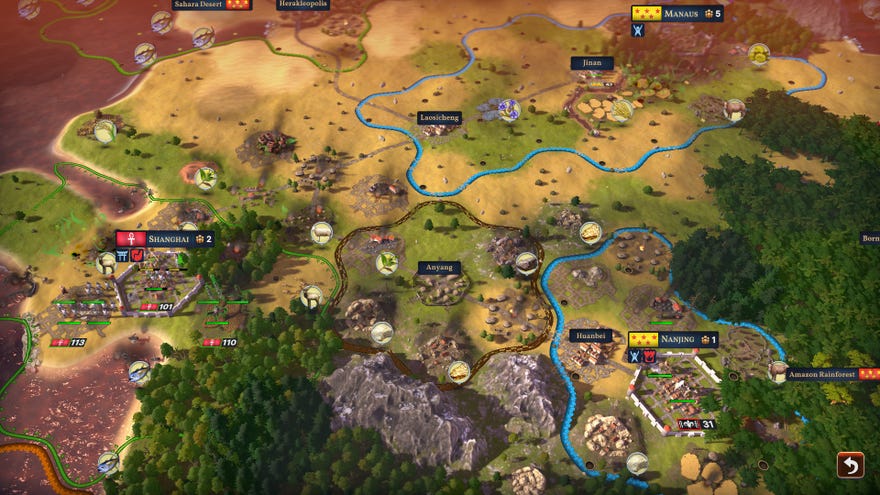Millenia review: leaving your mark on history shouldn't be this hard
Needed more time on the drawing board
It's been nearly eight years since the launch of Civilization VI, which is the longest gap between mainline Civ entries the series has seen since the first game appeared way back in 1991. It's the perfect time for a new contender to rise and claim the historical 4X throne, and indeed, many have tried, and some have even come close. Soren Johnson and the gang at Mohawk Games struck gold in Old World by zeroing in on the ancient era and opening up the personal lives of rulers and generals as fields of play. Humankind let you fuse and blend cultures over the arc of time like a world-historic Doctor Moreau.
Millennia is perhaps the Civ-like that's clung most tightly to the genre's apron strings. It has a few new ideas that sound interesting on paper, but even as back-of-the-box features, they're clearly not meant to significantly disrupt the established order. This is a strategy game that very much wants to be like Civilization, and has a lot of enthusiasm for the subject matter. Unfortunately, it isn't a particularly good student.
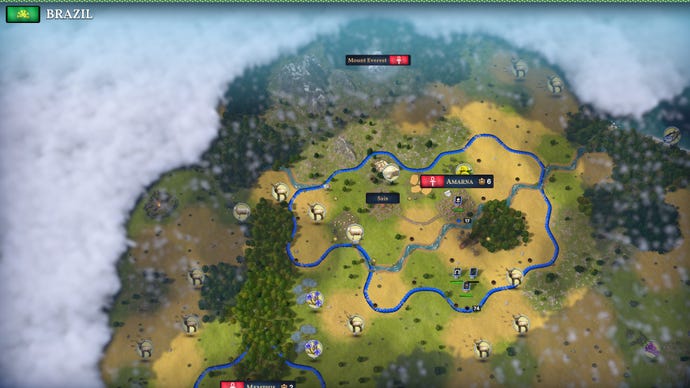
One of the first I had of this was when I realised, a few turns into my first game, that the nation I had chosen to lead was simply a label. In Millenium, Egyptians, Romans, and Americans all start out as blank slates - there aren't any inherent national traits here, nothing Egyptian about playing as Egypt or Brazilian about playing Brazil, other than the randomised names the game selects for your settlements.
That's… probably fine, I thought. It makes a certain amount of sense to give players the freedom to kitbash a culture from the ground up, even if it comes at the cost of some of the historical flavour and asymmetry that give Civilization its broad appeal. I like the idea in principle, too. Humankind's big idea was that culture isn't static, that it shifts and sometimes makes great leaps over time, incorporating past traditions into new ways of being as the eras roll by. Millennia's approach to this is grounded in the idea that culture is at least partly a reaction to a people's material circumstances.
The way this works in Millennia is that during key era transitions, you can select a "national spirit" for people to adopt. Early on, in the Age of Stone, options include "mound builders" and "wild hunters," while later on, I can adopt spirits like "Khans" and "Olympians." Each of these choices offers unique units, abilities, and buffs to further flesh out your national character and playstyle.
In practice, I never found these to feel very meaningful. Part of the problem is that like most things in Millennia, cultural development is boiled down to the distribution of various currencies earned with each passing turn. When I decided that my people would found an imperial dynasty, it manifested itself in a pop-up menu where I could dump "Government" points into various upgrades until I'd made my way up to a reform, at which point I would be able to use my "culture power" (when it was fully charged) to launch a peaceful revolution and select a new form of government.
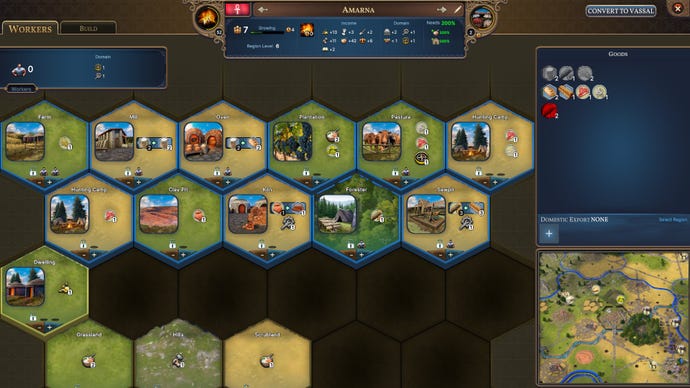
Alternatively, I could use some of those "Government" points to spark off a violent revolution, which is for some reason an ability that falls under the Government domain. Honestly, I had a terrible time trying to remember where each of these abilities lived. I could use Warfare points on military stuff, like healing units or ordering them on a forced march. But then I could also use Government points to raise a tribal army. Exploration points are used to spawn scouts, which makes sense, but they're also used by plague doctors to cleanse tiles with outbreaks on them.
Arguably the most important currency in Millenia is Improvement Points, which are used to build tile improvements in your territory. These are tucked away in the bottom left corner of the screen, separate from the panel where all your other points live, which is another odd organisation issue. Apart from that, though, is the role these play in the game. After a couple failed campaigns, I realised that Millennia really wanted me to use these points whenever I could, and that failing to exploit every tile around every one of my cities was a good way to doom a save early on.
Initially, this was pretty straightforward: I matched the few production structures I had, like hunting camps and foresters, to tiles that had wild game or forests on them, and then filled the rest up with farms and dwellings to promote growth. As the ages passed, I discovered new types of raw resources and secondary products I could make with them, and setting up each region with the chains necessary to produce these high-value goods was a delicate process and frequently a source of frustration.
There's no quick way to check what's already available in a capital region, either. If I thought I might need a midden (to boost sanitation) in a territory, I could look at its tiles on the campaign map, but many of the improvements aren't visually distinct enough to be able to really tell what's there at a glance. Instead, I'd have to open each capital and check the workers tab, where at least each tile was labelled with whatever improvements I had made on them.
Still, there's very little visualisation to help manage the economy, and again, there's a very first-draft disorganisation to what's there. There's no one-stop shop to see, for example, that the press improvement is only used for olives and flax, and that to process grapes into more valuable wine, I'd need the vats improvement instead. Finding the information I needed was, seemingly always, a tiring hunt.
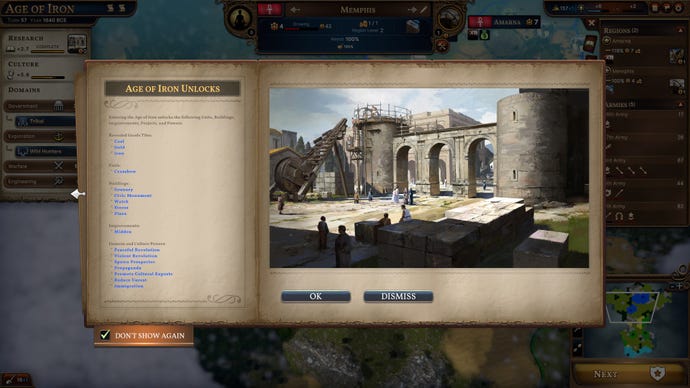
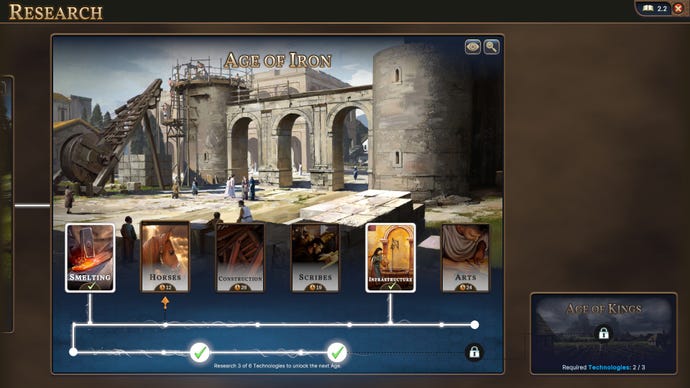
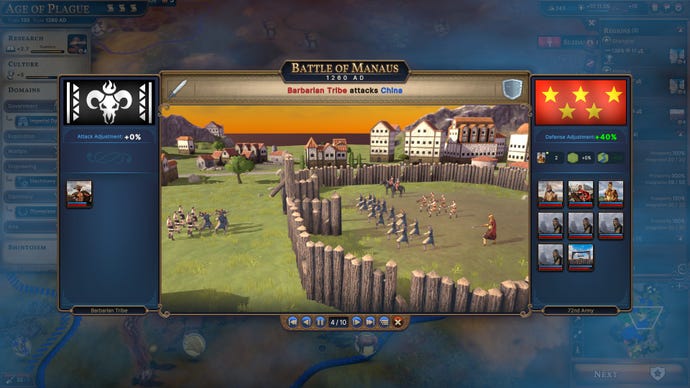
I thought that maybe Millenia would make up for these organisational misteps with its big distinguisher from Civilization: the way it handles the progression of historical epochs, or Ages. In Millennia, these are tied to the technology research system, and you have to unlock a certain number of techs from a specific age before you can begin research on the next one. What makes this interesting is that you can advance into alternate ages by fulfilling certain preconditions: early on, discovering three important landmarks opens up the chance to move into the variant Age of Heroes rather than the historical Age of Iron.
The variant ages open up some of the coolest stuff in the game - the Age of Aether, for example, is a Steampunk alternate history with lots of dirigibles and top hats, as well as new resources to gather and unique units to produce. However, they also include some of the most frustrating aspects of the game, especially with Crisis Ages that crank the difficulty and pressure up to punishing levels.
Here's the problem: You only get to set the next age you head into if you're the first nation to complete research on it. As I found out first hand, it doesn't matter how many aqueducts you build to boost sanitation if someone a few turns ahead of you on the technology curve is headed into the Age of Plague.
The incentive, then, is to barrel through the ages as quickly as possible, researching only the bare minimum of the fastest techs available, just to stave off the possibility of one of your neighbours neglecting to wash their hands as a matter of national policy. This results in absurdities like reaching the Middle Ages without having found out what horses are for, or firing crossbows at barbarian tribes in 1400 BCE. I could always go back and pick these ancient technologies at a discount once I'd moved on to the next age, but those were precious turns I could spend on something cutting edge that would keep me in the driver's seat when the next age rolled around.
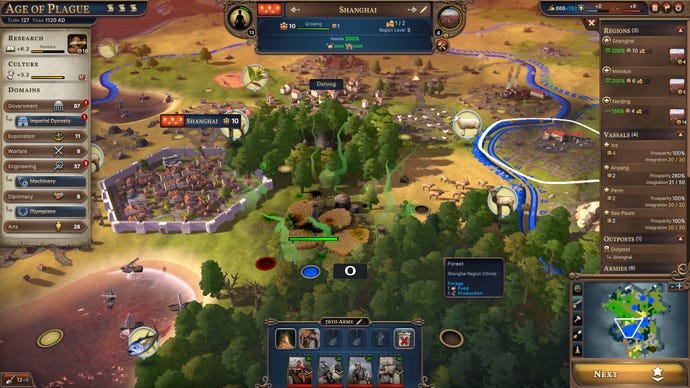
Much more often, though, I found myself riding along with whatever the speediest AI player wound up doing, because I'd inevitably need something like "construction" in order to keep my population housed and healthy. For all that, though, when India took my most recent campaign into the Age of Plague, I was wholly unequipped to deal with it. The era began by killing 33 percent of my population off the bat, and just got worse from there. I could send my new plague doctor unit around to cleanse outbreak tiles, but when I ran out of Exploration points, I just had to watch as the plague ran its course, killing off one unit of my population for every untreated tile. I could theoretically have deployed a second plague doctor, but researching "Humours" was going to take me 28 turns, and they'd be drawing from the same empty pool of Exploration points anyway.
This resulted in a failure cascade more violent and dramatic than anything I've seen in Civilization. The loss of workers to key tile improvements led to uprisings, and a surge in rebellions constantly ate away at my defences and increased my nation's "chaos" level. Successive provinces declared independence, and with my treasury drained, Millennia decided I was out of options.
So for all Millennia's talk about putting me in total control to build a nation from scratch and plot my own course through history, I rarely felt that my decisions were the ones that mattered. Spending thirty turns researching a neat new age variant, only to advance into the boring historical one because someone beat me there by a couple turns wasn't fun, and neither was having a crisis age kick off despite doing everything possible to forestall it. Any excitement I might have felt about starting a new campaign to explore fun alt-history ages with steampunk zeppelins and alien invasions was vastly outweighed by the knowledge that I would have to play in a highly specific way to make that happen, and the odds being against it even if I did.
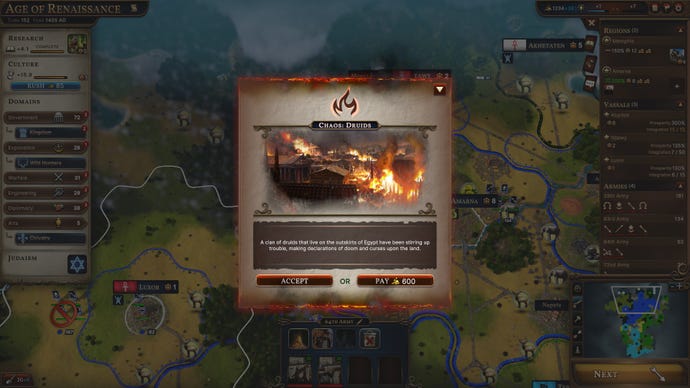
Millennia has other problems, too. Map visuals are all serviceable, but the battle animations are embarrassingly dated. Millennia let me create combined armies of three, four, or five individual units, but the turn-based battles played out automatically and I couldn't discern any rational pattern as I watched them. Each of my units would attack a seemingly random enemy unit according to a turn order that I didn't get to see.
Something else I didn't get to see was any non-white characters. As mentioned above, names like Egypt, Japan, and Zulu are really just empty faction labels in Millennia that could just as easily have been red, blue, and yellow flags, but it still seems strange to be playing a game in the year 2024 that defaults to "everyone is a white guy."
Millennia whiffs on some other fundamentals, too. Diplomacy and trade both feel half-formed, with very few points of interaction in either system. I could send merchants to other cities to generate wealth, or envoys could go to open up a few rudimentary interactions with other leaders. Frankly, any modern Total War game handles these with considerably more depth and nuance, which is disappointing.
The biggest miss, for me, is the Ages system, which feels like a solid concept that desperately needed more time in the pre-production concepting stage to make work the way it was intended. Pivoting to fantastical alternative eras of history could have made for a wildly exciting story with each campaign. Instead, it far more often ends up feeling like a compulsory family road trip to somewhere you don't want to be, while you pass the hours half-listening to another podcast about the Roman empire.
This review was based on a review build of the game provided by publisher Paradox Interactive.
